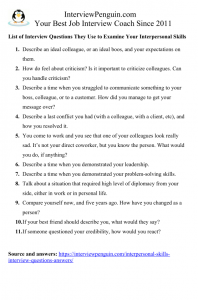Unless you work as a lighthouse keeper, or belong to one of those kids who make thousands each month online, without ever leaving their house or talking to anyone, interpersonal skills are important for your success as an employee. Speaking honestly, a skilled recruiter or HR manager doesn’t have to ask you a single question referring to your interpersonal skills, in order to get a good grasp of your abilities.
They will simply talk to you, ask you other questions (questions about your education, experience, attitude to various situations that happen in the workplace), and after hearing five or ten of your answers, they can tell the level of your listening skills, emotional intelligence, negotiation skills, leadership, and other skills.
Needless to say, not all recruiters are skilled, and not every interviewer knows what they are doing. Because of it, you will get some questions that refer directly to these skills. We will have a look at them, and I will try to suggest how you should answer each. Let’s start!
Table of Contents
Describe an ideal colleague, or an ideal boos, and your expectations on them.
First and foremost, this is a question of attitude. An excellent employee understands that people are different, that we can’t like everyone, and most importantly that they should focus on their job, and have high expectations on themselves–not on their colleagues.
In my view, a good answer is saying that an ideal colleague does not exist, that, just like you, people have their strengths and weaknesses. Say that you try to look for the good in people, and that it helps you to get along everyone, and you can easily tolerate mistakes, since you are aware of your own imperfections. You can say though that an ideal colleague is receptive to feedback from their coworkers, and that they try their best in work every day.
How do feel about criticism? Is it important to criticize colleagues. Can you handle criticism?
Without getting an honest feedback on our job, we can hardly see areas for improvement, and eventually start doing it better. Ensure the interviewers that you welcome constructive criticism, and that you hope to hear a lot of it in work.
You can also emphasize that it is important to use the right words when criticizing colleagues, and that praise (when they did something good) is equally important than criticism.
* Do not forget to check: Teamwork interview questions – Teamwork is one of the foundation stones of success of each company, and they will certainly test also your teamwork skills in an interview.
Describe a time when you struggled to communicate something to your boss, colleague, or to a customer. How did you manage to get your message over?
You should demonstrate that you do not mind going out of your comfort zone, in order to get your message over. Unless your colleagues understand your words, you can never cooperate effectively.
Speak about a situation when you used pictures, presentations, or demonstration, to help your colleagues understand, to get the message over. They are testing your attitude before anything else. Show them that you do not mind adjusting your language, and can talk to all kinds of people (in terms of their intelligence, knowledge and attitude towards you).
Describe a last conflict you had (with a colleague, with a client, etc), and how you resolved it.
Conflicts belong to every workplace, and it is impossible to entirely avoid them. Nevertheless, you can say that you do your best to avoid conflict situations, by not starting any. When you get involved, however, say that you try to approach it with a calm head, that you can admit making a mistake and being wrong (which is an important quality of each good manager), and most importantly that conflicts don’t affect you emotionally, you can get over them and go on with your job.
You should demonstrate this while narrating a situation from the past, but if you apply for your very first job, you can also say what you would do in a conflict situation. It’s much better than saying that you haven’t experienced any conflicts…
* Special Tip: Interviewers will test way more than your interpersonal skills in an interview. To learn how to answer all tricky interview questions, the real deal-breakers, have a look at our Interview Success Package. Up to 10 premium answers to basically every question you may face in your interview, will help you streamline your interview preparation, say exactly what the hiring managers want to hear from you, stand out from your competitors and eventually get the job. Thank you for checking it out!
You come to work and you see that one of your colleagues look really sad. It’s not your direct coworker, but you know the person. What would you do, if anything?
Interviewers try to understand more about your empathy with this question. Companies and teams where workers care for each other, and can offer words of encouragement, typically achieve better effectiveness, since people feel like they belong somewhere and they try their best in work every day.
I suggest you to say that you would go to the colleague, ask if everything was all right, and offer words of encouragement.
Many people would say that they simply do not care, that they have to focus on their job and duties, but in most cases this is a bad answer. Companies look for people who care for each other, and who can help each other in difficult moments.
Describe a time when you demonstrated your leadership.
Leadership is another crucial capacity for each manager, and you may face several leadership interview questions while meeting the employer. The key is to focus on positive leadership, that means when you helped someone to grow, not on a situation when you scorned someone, or demonstrated your leadership by dismissing an employee.
You can also talk about leading a team (the last project you worked on), but if you’re more a team player than a team leader, it’s fine to talk about one-on-one leadership, either in work, school, or even your personal life (you can be a good leader and role model for your children).
Five other interpersonal skills interview questions you may get
- Describe a time when you demonstrated your problem-solving skills.
- Talk about a situation that required high level of diplomacy from your side, either in work or in personal life.
- Compare yourself now, and five years ago. How have you changed as a person?
- If your best friend should describe you, what would they say?
- If someone questioned your credibility, how would you react?
Idea for you: Download the list of all questions in a one page long PDF, and practice your interview answers anytime later:

Summary and next steps
Certain things are hard to pretend, and interpersonal skills definitely belong to them.
A skilled interviewer will get a good grasp of your communication and social skills, after talking to you for twenty or thirty minutes–regardless of your answers to their questions.
But, as I said already, not every interviewer is skilled, and not every HR manager knows what they are doing.
Therefore it makes sense to prepare for some of the questions, and, if you can not do it in a better way, demonstrate your interpersonal skills with some good interview answers. I hope you will manage to do it, and wish you good luck!
May also interest you:
- Leadership interview questions – Companies strive to hire future leaders. Learn how to convince them that you can become such a leader.
- Cultural fit interview questions – Learn how to convince the hiring managers that you will fit their existing team of employees. In some cases this can be one of the main hiring criteria.
- Strategic planning interview questions.
- Analytical skills interview questions.


